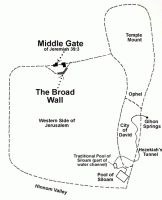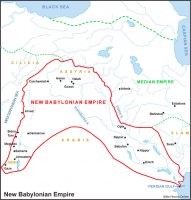seekeroftruth
Well-Known Member
Jeremiah 39: 1 In the ninth year of Zedekiah king of Judah, in the tenth month, Nebuchadnezzar king of Babylon marched against Jerusalem with his whole army and laid siege to it. 2 And on the ninth day of the fourth month of Zedekiah’s eleventh year, the city wall was broken through. 3 Then all the officials of the king of Babylon came and took seats in the Middle Gate: Nergal-Sharezer of Samgar, Nebo-Sarsekim a chief officer, Nergal-Sharezer a high official and all the other officials of the king of Babylon. 4 When Zedekiah king of Judah and all the soldiers saw them, they fled; they left the city at night by way of the king’s garden, through the gate between the two walls, and headed toward the Arabah.[a]
5 But the Babylonian[b] army pursued them and overtook Zedekiah in the plains of Jericho. They captured him and took him to Nebuchadnezzar king of Babylon at Riblah in the land of Hamath, where he pronounced sentence on him. 6 There at Riblah the king of Babylon slaughtered the sons of Zedekiah before his eyes and also killed all the nobles of Judah. 7 Then he put out Zedekiah’s eyes and bound him with bronze shackles to take him to Babylon.
8 The Babylonians[c] set fire to the royal palace and the houses of the people and broke down the walls of Jerusalem. 9 Nebuzaradan commander of the imperial guard carried into exile to Babylon the people who remained in the city, along with those who had gone over to him, and the rest of the people. 10 But Nebuzaradan the commander of the guard left behind in the land of Judah some of the poor people, who owned nothing; and at that time he gave them vineyards and fields.
11 Now Nebuchadnezzar king of Babylon had given these orders about Jeremiah through Nebuzaradan commander of the imperial guard: 12 “Take him and look after him; don’t harm him but do for him whatever he asks.” 13 So Nebuzaradan the commander of the guard, Nebushazban a chief officer, Nergal-Sharezer a high official and all the other officers of the king of Babylon 14 sent and had Jeremiah taken out of the courtyard of the guard. They turned him over to Gedaliah son of Ahikam, the son of Shaphan, to take him back to his home. So he remained among his own people.
15 While Jeremiah had been confined in the courtyard of the guard, the word of the Lord came to him: 16 “Go and tell Ebed-Melek the Cushite, ‘This is what the Lord Almighty, the God of Israel, says: I am about to fulfill my words against this city—words concerning disaster, not prosperity. At that time they will be fulfilled before your eyes. 17 But I will rescue you on that day, declares the Lord; you will not be given into the hands of those you fear. 18 I will save you; you will not fall by the sword but will escape with your life, because you trust in me, declares the Lord.’”
a. Jeremiah 39:4 Or the Jordan Valley
b. Jeremiah 39:5 Or Chaldean
c. Jeremiah 39:8 Or Chaldeans
This is pretty descriptive..... so I am not adding much. The easy English commentary was one of the first to pop up this morning.... and it explains the timing in the first two verses.
These two verses are a shorter account of Jeremiah 52:4-6. The Hebrew year began in March to April. So Nebuchadnezzar began his attack on Jerusalem in January 588 BC. In Jeremiah 52:4, it adds that it was on the 10th day. The Babylonian attack continued until July 587 BC, apart from a brief period when they left. The Babylonians forced their way through the city walls. That happened just when there was no food left in the city.
One of the Babylonian officials was called Nergal-Sharezer. He may have been Neriglissar, who later became king of Babylon. There is another reference to him in verse 13.
Zedekiah saw 'them' coming. That may refer to the officers who were at the gate. Or it may refer to the Babylonian soldiers as they were arriving. Zedekiah escaped through the king's garden. That was near to the pool called Siloam (Nehemiah 3:15). The gate between the two walls was probably the Fountain Gate (Nehemiah 2:14). The Arabah was the Jordan valley to the north of the Dead Sea. Zedekiah may have wondered whether to go further south. Or he could have crossed to the east side of the river Jordan. But the Babylonian soldiers caught him near to Jericho. Nebuchadnezzar had his main camp at Riblah. It was a town in Syria near to the river Orontes. Nebuchadnezzar decided what cruel punishment he was going to give to Zedekiah. First Zedekiah had to watch the soldiers as they killed his sons. Then the soldiers made him blind. That was an ancient punishment. The Philistines made Samson blind (Judges 16:21). Then Zedekiah went to Babylon with metal chains round him. They put chains round prisoners to make sure that they did not escape. Zedekiah probably died in Babylon.
Nebuchadnezzar appointed Gedaliah to govern Judah. The home, to which Gedaliah took Jeremiah, was the official house of the ruler. At Lachish, people found the mark of a 6th century stamp. People used it to sign records. It has these words. 'Belongs to Gedaliah who is over the house.’ The word 'over the house' was the official way to describe the king's chief minister.
Jeremiah's story seems to be taking a turn like Joseph's did back in Genesis. Joseph was thrown in the well..... then he was taken to prison..... and then he resided in the palace..... all because his brothers didn't like his dreams. Now Jeremiah has been thrown in the well.... [after] he was imprisoned.... and now he's living in the same house with the kings chief minister. ..... because they didn't like his prophecy. Makes me wonder..... hhhhmmmm.Now.... on to the looking at the map.... how does this help me understand what is going on over there today?


